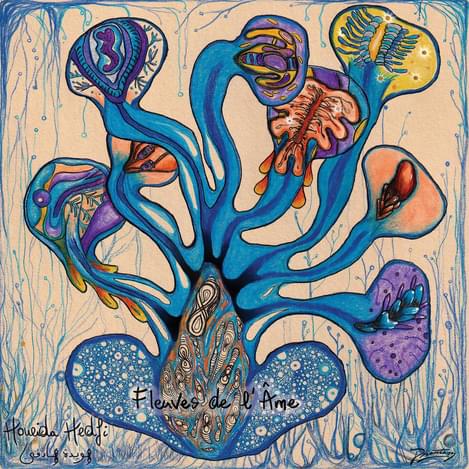Nine years in the making, Houeida Hedfi's Fleuves De l’Ame proves to be worth the wait
"Fleuves De l’Ame"

Having hit it off with Hedfi after collaborating on a 2011 compilation showcasing female Tunisian artists, Olof Dreijer of Swedish electronica duo The Knife is on production duty. However, Fleuves De l’Ame couldn’t be further removed from the kind of cheesy culture clash where club-friendly beats are plastered all over suitably ‘exotic’ music forms. Neither does the album bring to mind more respectful musical bridge-building expeditions where ‘Western’ stars engage directly with traditional sounds from remote parts of the globe.
Although the album’s roots are in traditional Tunisian templates, rhythms, and scales, the eight often extensive tracks (all named after major rivers, which is only appropriate - this music really does flow) glide effortlessly between remote corners of the musical world, with minimalist modern classical, ambient soundscapes, electronica, and even free jazz adding to the compelling list of primary ingredients. They also offer startling yet seamless mood swings: some tracks emerge with unhurried, graceful calm, only to become gradually submerged in tension and decibels.
Carried by strings, violin, bouzouki and keyboards, both the subtly epic shapeshifting likes of “Envol de Mekong” (which starts off disarmingly pretty and ends up in an outbreak of grizzly noise not that far removed from drone lords ala Sunn O)))) and more minimalist compositions like the electronically manipulated “Namani Gange” and the blissful balm of “Appel Du Danube” are built on instantly memorable melodies, with subtle mutations of the natural sound of the instruments generated by Dreijer’s sound design adding a layer of ultra-modernity, edge and unpredictability to the proceedings. Hedfi’s roots in stambeli - a percussive afro-arab sufi trance music - claim the spotlight on the hypnotic drum-fest of “Echos de Medjerda” (given a surreally spooky touch by the twitchy flutter of Dreijer’s heavily treated flute), whilst the unhurried progression of the mesmerising 18-minute closer “Chemineminent de Tigre” resolves in a tense free-form freak-out reminiscent of the more abstract offerings of John Coltrane and Charles Mingus.
Listening to this richly textured yet still spontaneous and loose album, you get the impression that after having waited until the age of 27 to start playing music alongside her career as an academic, Hedfi was not in a rush to release her debut solo album until it was just right. She was right to wait: the more deeply you dig in, the more compelling depths Fleuves De l’Ame reveals.
Get the Best Fit take on the week in music direct to your inbox every Friday

Prima Queen
The Prize

Femi Kuti
Journey Through Life

Sunflower Bean
Mortal Primetime





